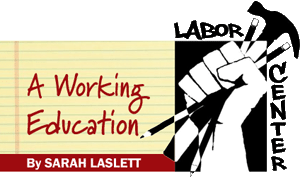OPINION
Getting beyond the usual suspects at your union activities
 (July 18, 2014) — Are you one of the usual suspects? You know what I mean — someone who shows up at the union meetings, goes to rallies, participates in lobby days, and when your rep calls, you usually answer the phone, or at least listen to the voicemail.
(July 18, 2014) — Are you one of the usual suspects? You know what I mean — someone who shows up at the union meetings, goes to rallies, participates in lobby days, and when your rep calls, you usually answer the phone, or at least listen to the voicemail.
Are you also one of those people who complains about how it’s always the same dozen or 40 people who show up at the membership meetings and how apathetic people are?
If so, I’ve got an idea for you. Next time you’ve gotten ticked off by someone making snide comments about how useless your union is… after you’ve been to one more endless, Robert-rules driven meeting and seen all those glazed-over faces… next time you find yourself wondering why you bother… go talk to someone new at work.
Pick one person you’ve rarely or never spoken to. Maybe someone you’ve just exchanged pleasant “good morning” nods with. Someone whose views on your union you really don’t know. Someone who isn’t another usual suspect just like you. And don’t go up to them with your “here’s why our union’s important” speech all ready. Approach them with one or two questions like, “How long have you been here now? Do you like your job?”
In other words, strike up a conversation.
You might be surprised by how much you have in common with this person. You might get in to a satisfying bitch session about work or, even better, a conversation about how you like your jobs and think that what you do makes a positive difference. They might even want to ask you stuff about your union. They also might want to complain about your union — and it’s OK for you to JUST LISTEN. Whatever you do, don’t jump right in to defending your union, as much as you might want to. You might offer a few (only one or two) pieces of information for them to think about.
And when you do get around to talking to this person about your union (maybe in a second or third conversation, but not until it feels comfortable and right — remember, you’re not a salesperson here — the conversation has to have value for you, too) don’t immediately ask them to come to a meeting. Have a list of options in your back pocket (mentally, not an actual piece of paper in your pocket) about what they might do — join a tweet brigade, wear a button, ask a question about the contract or how your union works.
Taking little steps like this is important for us usual suspects because, you see, we’re so completely convinced about the righteousness of what we think and do (and maybe convinced that others who don’t do the same are losers) that this is going to feel strange and uncomfortable at first. But this is a way (notice I don’t say “the” way) to begin building a community at work and throw a wrench in the grinding machinery of indifference.
And, who knows, next time you come with a specific union ask (“come to lobby day,” “call your legislator,” “complete a survey,” or, yes, even “come to a meeting”) you might, just might, get positive responses from some unusual suspects.
If you have labor education questions or topics that you’d like to see addressed in future Working Education features, email me at sarah.laslett@seattlecolleges.edu.
Sarah Laslett is Director of the Washington State Labor Education and Research Center at South Seattle College. Her column — “A Working Education” — is a regular feature of The Stand. Learn more about the Labor Center here.





